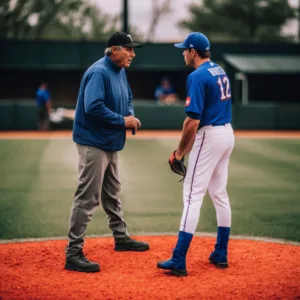 These top ten ways to annoy your pitching coach can also be interpreted as ways to NOT annoy your pitching coach. I am definitely not telling you to deliberately tick off your pitching coach. I am just giving you a list of conflicts that all pitchers run into with their pitching coaches and some advice to avoid them.
These top ten ways to annoy your pitching coach can also be interpreted as ways to NOT annoy your pitching coach. I am definitely not telling you to deliberately tick off your pitching coach. I am just giving you a list of conflicts that all pitchers run into with their pitching coaches and some advice to avoid them.
Let's face it, most pitching coaches have an average to below average education on the science of the high velocity pitcher. This is why the best pitching coaches I had in my career just told me to keep doing what I was doing. They knew I had done my homework when it came to learning effective pitching mechanics but before I gained this respect from my coaches, I did have to hide most of my training from them.
In this article, I will first go over the pitcher pitching coach relationship and all of its dysfunction and then I will list the top 10 ways to put your pitching coach into an early retirement!;) Some of these ways listed I actually did in my career and got more than a mouth full from a few coaches. My hope is that you can learn from my experience and gain respect from your coaches, while continuing to follow the best program, even if it isn't theirs.
The Pitcher Pitching Coach Relationship
 The coolest thing about life is when you run into your college or high school pitching coaches 10-15 years after your career. You learn very quickly that they really never deserved to be on a pedestal. They are just average Joe's with below-average jobs. Not to say they are not good people. Sometimes they even will admit that they regret not helping you more in your own career.
The coolest thing about life is when you run into your college or high school pitching coaches 10-15 years after your career. You learn very quickly that they really never deserved to be on a pedestal. They are just average Joe's with below-average jobs. Not to say they are not good people. Sometimes they even will admit that they regret not helping you more in your own career.
There is a major problem that arises when the young pitcher meets his pitching coach in high school or college baseball for the first time. The problem is the young man is looking to this coach as a mentor, someone he believes is going to help him mature and grow in this game when the pitching coach is looking back at the young man as some number on a uniform who is going to help him look good or he will find someone else to do the job. This is why the young man is always the one who gets hurt in this relationship. It was dysfunctional from the very beginning. I am speaking from my own experience and the experience of my teammates in my career and I have seen this dysfunction boil over to the max. I have seen players and parents take swings at pitching coaches and pitching coaches take swings back. It is always a hostile environment and it all stems from this major problem from the very beginning of the difference in perspective in the pitcher and pitching coach relationship.
The young pitcher will have a ton of success in this game if he plays for his team and not his coaches. Also if he does whatever it takes to be the best he can be, no matter what the coaches try to make him do or NOT do. The only reason a pitching coach tells a pitcher how he should train or move his body is that the pitcher is not succeeding. The coach is only telling you what to do because he really needs you to succeed in his own job. If you start to find success again you will find your coach not bothering you anymore!
Top Ten Ways to Annoy Your Pitching Coach
Like I said to start this article, pissing off your pitching coach is a bad idea. I just put together this list to give you a good idea of the issues most pitchers have with their pitching coaches and to also give you all the reasons they are usually wrong but keep all of this information to yourself unless you really feel your pitching coach can handle it.
- Send Your Coach a Link to TopVelocity.net in an Email Titled FYI - Subject: FYI Body: Dear Coach, You really need to check out this website! www.TopVelocity.net
- When Your Coach Tells You to Go Run 5 Miles, Give Him a Case Study That Links it to a Decrease in Pitching Velocity - Here is one of the many case studies that show the link. It is called, Non-compatibility of power and endurance training among college baseball players, which discovered the negative correlation specific to baseball players:
Baseball players, athletes who rely heavily on power and speed, conventional baseball conditioning involving significant amounts of cardiovascular endurance training should be altered to include more speed/power interval training. During the season, the endurance training group decreased an average of 39.50 ± 128.03 watts while the speed group improved an average of 210.63 ± 168.96 watts. These data demonstrate that moderate- to high-intense cardiovascular endurance and neuromuscular power training do not appear to be compatible when performed simultaneously.
- When Your Coach Puts You in the Balance Position, Give Him The Case Study That Proves it Decreases Pitching Velocity - Here is that case study called, The relationship between balance and pitching error in college baseball pitchers, which discovered the negative correlation:
The finding suggests a relationship between increased body sway at the balance point position with eyes closed and increased pitch velocity. The authors expected a negative correlation between sway velocity and pitch velocity. The explanation for this finding is unknown.
- When Your Coach Tells You Pull Your Glove Side Around, Tell Your Coach Case Studies Link This to a Decrease in Pitching Velocity - The work of Rob Whiteley has a link to this case study. Here is an excerpt from his findings:
The skilled group of throwers were found to have a reduction in the amount of non-throwing shoulder movement in all directions for both fastball and curveball trials during the period from stride foot contact until ball release. A reduction in the amount of x-axis movement was strongly associated with an increase in fastball velocity, and perceived skill level.
- When Your Coach Says No Weight Training for Pitchers, Give Him All These Case Studies That Link Weight Training to an Increase in Pitching Velocity - Baseball Throwing Speed and Base Running Speed: The Effects of Ballistic Resistance Training, Baseball Throwing Velocity: A Comparison of Medicine Ball Training and Weight Training, and Effect of Different Training Programs on the Velocity of Overarm Throwing: A Brief Review to list a few.
- When Your Pitching Coach Tells You To Shorten Your Stride, Send Him the Studies That Prove Stride Length Increase Pitching Velocity - The work of Rob Whiteley has a link to this case study below:
Montgomery and Knudson (2002) in an investigation of six professional baseball pitchers found that increasing the stride length to 85-90% of their body height to be associated with an increase in throwing velocity in four of them.
- When Your Coach Makes You do Extreme Long Toss, Send Him My Latest Article in Baseball America on Why This Decreases Pitching Velocity - Here is a link to the article: Study Proves Pitching Velocity Decreases With Extreme Long Toss.
- When Your Coach Tells You that You Do Not Throw Enough, Show Him The Case Studies That Link High Pitch Counts to Arm Injury - Here is that case study called, Effect of pitch type, pitch count, and pitching mechanics on risk of elbow and Shoulder pain in youth baseball pitchers. The results from the study are here:
The risk of shoulder pain is 2.5 times greater for pitchers who throw more than 75 pitches per game. The risk of elbow pain is 3.5 times greater for pitchers throwing more than 600 pitches per season.
- When Your Coach Tells You To Loss Weight and Get More Flexible, Tell Him That This Didn't Make Your Girlfriend Throw Harder - This one doesn't need any science. It should make the point on its own.
- When Your Coach Tells You Velocity Doesn't Matter, Then Tell Him You Would Agree if You Could Find Just One Low 80s Pitcher in the MLB Who Doesn't Throw a Knuckleball - This is another point that doesn't need the science to back it up.
Yes, your pitching coach would be really pissed off if you treated him like this. As much as we would all like to do this with our coaches, I would highly recommend against it. The problem is he makes the roster and he will always use this as leverage against you. This is why you should smile and do whatever he asks of you in front of his face and then when you are out of his presence, you can do what you feel is best for your career. In an ideal world, we would NOT have to worry about this but unfortunately, this isn't an ideal world. This game is full of ego and that is because it is full of a bunch of guys trying to show their stuff. The better you are at hiding your work from your coach if you feel it would only piss him off, the better your relationship with him! Don't piss him off, it will only come back to hurt you in the end!



